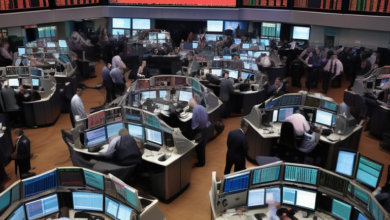US Stock Market News Update July 24, 2024

Key Highlights
On the stock market in the US, things hadn’t looked this bad since 2020. The S&P 500 and Nasdaq Composite both took a big hit. Alphabet, which owns Google, did well overall but didn’t make as much from YouTube ads as people thought they would. Tesla also let investors down with not-so-great news about their earnings and car sales dropping.
These disappointments from big tech names like Alphabet (Google’s parent company) and Tesla played a big part in why stocks went downhill fast. Despite these setbacks, it’s not all doom and gloom for the earnings season so far; over one-fourth of companies in the S&P 500 have shared their profits for the second quarter, with around four out of every five surpassing what was expected.
However, June brought some more troubling news that helped push stocks lower – manufacturing wasn’t doing too hot and fewer new homes were sold than anticipated.
Overview of Today’s Market Performance
The US stock market experienced a significant sell-off on July 24, 2024, as investors reacted to underwhelming earnings reports from major tech companies. The Dow Jones Industrial Average shed 504.22 points, or 1.25%, closing at 39,853.87. The S&P 500 and Nasdaq Composite had their worst days since 2022, with the S&P 500 losing 2.31% and the Nasdaq sliding 3.64%.
The sell-off was driven by disappointing reports from Alphabet, the parent company of Google, and Tesla. Alphabet reported a top- and bottom-line beat, but its YouTube advertising revenue came in below expectations. This led to a 5% drop in Alphabet’s stock, its biggest one-day drop since January 31. Tesla shares declined 12.3%, their worst day since 2020, due to weaker-than-expected results and a 7% year-over-year drop in auto revenue. Other major tech stocks, including Nvidia, Meta Platforms, and Microsoft, also fell in sympathy with Alphabet and Tesla.
Investors were particularly focused on these earnings reports as they provide insight into the performance of megacap companies during the second quarter. These companies have been responsible for the majority of the market’s gains this year, so any disappointments can lead to a reality check for investors.
The sell-off was also influenced by a combination of factors, including an overbought market, high expectations for earnings, and a seasonally weak period for equities. Investors had been anticipating a pullback, and this sell-off was not a total surprise. Despite the market volatility, experts view this correction as a potential opportunity within the context of a bull market.
In terms of market performance, the broad market index, represented by the S&P 500, lost 2.31% and closed at 5,427.13. The tech-heavy Nasdaq Composite slid 3.64% to end at 17,342.41. Both indexes closed at their lowest levels since June 10, 2024. The Dow Jones Industrial Average closed below 40,000 points for the first time in two weeks.
Additionally, the small-cap Russell 2000 was down 2.1% on the day, but it has still gained 7.2% for the month. This index has been performing well as investors have been rotating out of large-cap tech names into smaller ones that have been beaten down. In July, the Dow Jones has gained 1.9%, while the S&P 500 has slipped 0.6% and the Nasdaq has fallen 2.2%.
Overall, this sell-off serves as a reality check for investors who have been enjoying the market’s strong performance. It highlights the importance of carefully evaluating earnings reports and managing expectations in a volatile market.
Sector Highlights
On July 24, 2024, the tech world really felt a pinch during a big market downturn. It was mainly because some of the biggest names in technology didn’t do as well as everyone hoped they would with their earnings reports. This had quite an effect on how the whole market did.
With artificial intelligence (AI) being something investors are really keeping an eye on, companies like Tesla have been under the microscope. Tesla is known for its electric cars and pushing forward with AI technology. But when it shared that things weren’t going great financially and its car sales were down, its stock price took a major hit—falling by 12.3%. That was its worst day since back in 2020! And this bad news spread to other tech stocks too, especially those listed on the Nasdaq index.
Speaking of which, Nasdaq—which has lots of tech stocks—took a dive by 3.64%, marking its worst one-day performance since October last year. This just goes to show how sensitive and up-and-down the tech sector can be based off company performances and what people think will happen next.
In comparison though, Dow Jones Industrial Average wasn’t shaken up too much by all this chaos because it’s made up of different kinds of businesses—not just heavy on tech ones—and ended only slightly lower at -1.25%.
This tough time for folks betting big on technology serves as kind of a reality check, reminding them that even though there’s been loads of growth and cool innovations lately within these companies; there are still risks involved that could mess things around anytime.
As we move ahead from here after seeing such dramatic drops particularly among leading players like Tesla—an iconic name in both electric vehicles making space & AI—the eyes remain glued to see how other firms fare with their financial updates coming out soon.
Overall then? The events unfolding around July showed us once again about not putting all eggs into one basket due to unpredictable swings seen across sectors but more so within areas experiencing rapid advancements yet facing uncertainties such as technological innovation fronts led notably via entities operating under banners including but not limited to nascent fields tied closely alongside evolving landscapes surrounding notions tethered intricately towards realms encompassing facets related directly against backdrops involving discussions centered upon artificial intelligence amongst others thereby underscoring critical aspects necessitating balanced approaches geared towards investment strategies mindful equally about potential rewards juxtaposed vis-a-vis inherent perils lurking amidst avenues pursued aggressively perhaps overly so at times without adequate considerations accorded towards implications stemming forth consequentially hence warranting cautious optimism moving forward.
Earnings Season Updates
The earnings season has kicked off well, with over a quarter of S&P 500 companies sharing their second-quarter results. So far, about 80% have surpassed what was expected of them based on FactSet’s data. Yet, not all news is good; Alphabet and Tesla didn’t do as well as hoped.
With Alphabet, the company behind Google saw its shares fall by 5%, marking its worst day since January 31. This happened even though they did pretty okay overall but fell short because YouTube’s ad money wasn’t up to par. Since ads on YouTube are a big deal for Alphabet in terms of income, people were really watching this area.
On another note, Tesla also had some trouble showing weaker results than many thought they would and seeing auto revenue go down by 7% from last year. Their stock took a significant hit too—down by more than 12%, which was their biggest drop since back in 2020— and it’s been tough for them lately with four quarters not meeting expectations.
These less-than-stellar performances from both tech giants like Alphabet (Google) and Tesla added to why stocks went down across the board on July24th . Investors were especially let down because these companies usually help drive market gains forward throughout the year; when they don’t meet those high hopes, volatility tends to spike along with doubts among investors.
Despite these bumps from major players in technology, earnings season remains strong overall— a lot of S&P500 businesses are doing better than anticipated which shows resilience amidst challenges such as pandemic impacts or economic shifts.
As we move through earnings reports coming out over the next few weeks , everyone’s keeping an eye out for how things like sales growth, net income, and future outlooks shape up. These details will be key in understanding where different industries stand, and how individual companies might perform moving ahead .
Remember though, this time can lead to unpredictable swings in markets. Companies could surprise us either way, and reactions may vary. So, it pays off being thorough about each company’s basics while considering larger economic pictures before making any investment choices .
All said, the current period is crucial for investors wanting insights into various sectors’ health. While there have been disappointments here and there, strong showings so far bring hope. Looking closely at upcoming reports will be important, in adjusting strategies accordingly .







